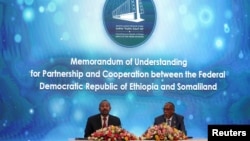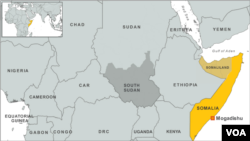As the dispute between Somalia and Ethiopia over sea access escalates, Ethiopia's prime minister on Thursday said his country was seeking access to the Red Sea "through peaceful means."
Speaking at the parliament where he was questioned by lawmakers, Abiy Ahmed said Ethiopia has a "clear stance" on the issue.
"Let the world hear today, Ethiopia maintains a clear national interest — it needs Red Sea access through peaceful means," he said.
"If we do not succeed, our children will," Abiy added.
Somalia and Ethiopia have been involved in a heated diplomatic dispute since Addis Ababa in January signed a memorandum of understanding (MOU) with the self-proclaimed independent republic of Somaliland, a move Somalia sees as infringing on its sovereignty.
Ethiopia and Somaliland defended the MOU which, if implemented, would give Somaliland recognition from landlocked Ethiopia in return for the leasing of about 20 kilometers of seafront, according to Somaliland officials.
Speaking at the United Nations General Assembly last month, Somali Prime Minister Hamza Abdi Barre said Somalia faced a "serious threat" from Ethiopia for signing a sea access deal with Somaliland.
Barre said Somali ports have always been accessible for Ethiopia's legitimate commercial activities but alleged that Ethiopia has other motives.
"Ethiopia's attempts to annex parts of Somalia under the guise of securing sea access are both unlawful and unnecessary," Barre said.
Barre warned that Ethiopia's approach and deal with Somaliland could "embolden secessionist movements."
Abiy on Thursday denied any interest in annexation.
"When we signed the MOU with Somaliland, we requested a 99-year lease, but they didn't agree, and we signed a 50-year lease agreement," he said.
"How can a 50-year lease be an annexation?" Abiy asked.
Abiy told MPs that Ethiopia did not have any agenda in Somalia other than access to the sea.
"Ethiopia is a country which has the second-largest Somali population in the world next to Somalia. They are our brothers," he said.
Ethiopia has several thousand troops in Somalia helping its government in its struggle against Islamist extremists.
Somalia on Tuesday expelled an Ethiopian diplomat, accusing him of engaging in "activities incompatible with his diplomatic role."
Somalia did not specify the actions allegedly committed by Ali Mohamed Adan, a counselor at Ethiopia's embassy in Mogadishu, but said in a statement that they "constitute a breach of the Vienna Convention on Diplomatic Relations."
Abiy did not comment on the expulsion of the diplomat during the session at Parliament.
This story originated in VOA's Horn of Africa service.





